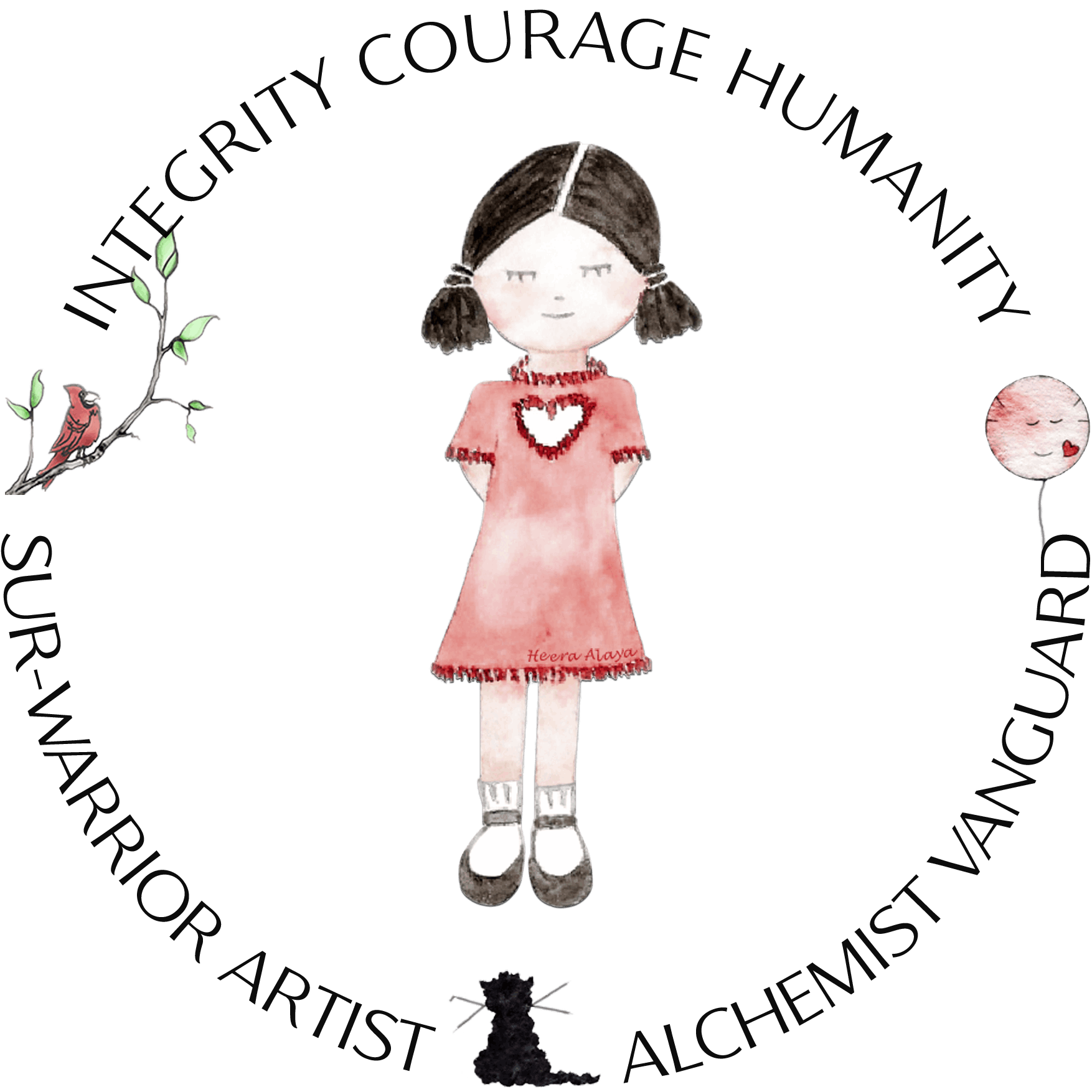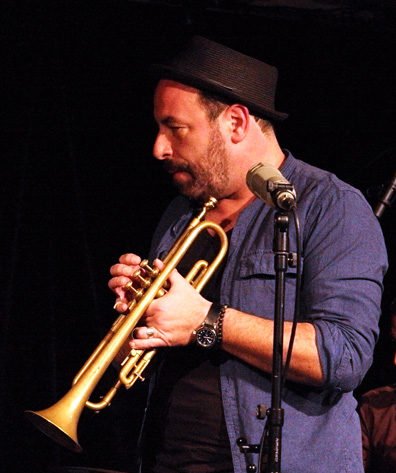
“Discipline and routine are important.
The more regular and methodic you are,
the more it works.”
CHRISTOPHE LELOIL
Trumpeter and teacher, FR
February 29th, 2024
OPEN WINDOWS | In Conversation
Heera Alaya: [We walk out of pre-concert rehearsal] I enjoyed observing you during rehearsals. Thank you for having me.
Christophe Leloil: You are welcome.
Amid instrument tuning, sound checks and lighting, I observed the camaraderie between you and your band.
No, no, I hate them [his band].
[Laughter]
I don’t buy that [disliking his band]! I get a feeling you’ve played together for a while.
We [Cedrick Bec, the drummer; Pierre Fenichel, the bassist; and Andrew Sudhibhaslip, the guitarist] have been touring since the summer of 2020, performing at around 20 concerts.
What role does camaraderie play in performance?
We should give camaraderie little importance. We are all professional musicians, so we don’t need to be friends. Musicians need to be good with what they do and exchange in every situation where they can.
Of course, it’s cool to tour for a long time and experience a long journey. For example, Cedric [drummer] and I have worked together for almost 20 years on multiple projects and toured many countries. It is the same situation with Pierre [bassist]—we have toured the United States, Armenia and Europe. We know each other; we have the same kind of humour, music taste, and media experience—we agree on many things. This knowledge makes things fluent, natural, and enthusiastic since we are always happy to see each other and go back to work together.
Do you miss this group [Cedrick Bec, Pierre Fenichel and Andrew Sudhibhaslip] when you play with a different set of musicians, or does newness have its energy?
A: Every situation brings different experiences. Sometimes, you go on tour with people for a week or two and don’t like someone, but that is how it goes. I have sometimes been touring with guys where it is a very tense situation on stage: “Oh man, I don’t like you; I don’t like the way you talk to me; I don’t like the way we are playing together”, but since we are all employees, we have to manage.
This tension also makes the music happen differently. First, it’s a question of trust between each other, of reflex through different ways to hear each other, and sometimes it works even if you don’t like the people. Since we play jazz, there is a lot of instant improvisation. You are surprised. Sometimes, you are even more surprised when you don’t know the people.
Being able to play music, whoever plays music with you, whatever the piece, how difficult or easy it is or how sensitive it is, you still play. At that moment, the audience appreciates the music. There are times when you reach music at a high level, no matter with whom we are playing—you don’t know their experience, you don’t know their life—you are just receiving their sound, you are accepting their feelings, their skills, and that makes it work.
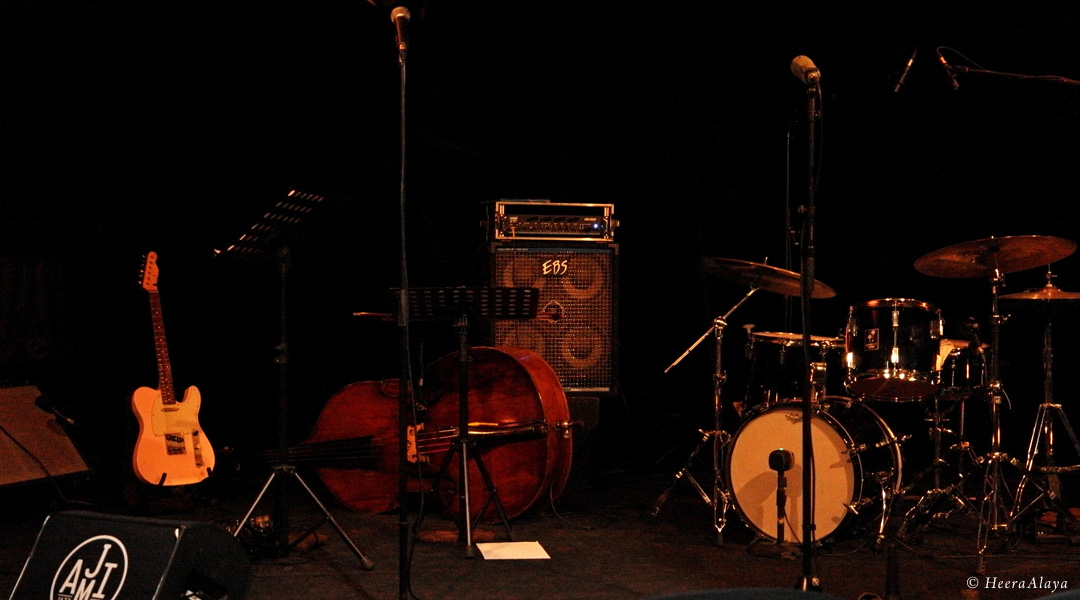
What is the small cup-like piece you attach to your trumpet?
Oh, that’s a mute.
And what is the purpose of a trumpet mute?
A mute subdues the sound, altering the tone to a desired sound.
Why do you switch between using and removing the mute?
The mute piece helps me be organised at that moment, achieving how I want the sound and when I want a sound a certain way.
Your rehearsals are more than the band practising—they are about the lighting and the sound check.
Exactly. When we arrive at the show’s venue, we mainly check the orchestra’s sound for the audience. It’s a moment we try to get the sound on the stage. We keep it brief; we are not rehearsing (We have already done this beforehand.) and don’t get cues. Once our sound check is complete, the crew can fix the lights.
I also noticed you didn’t go to the stage right away—you sat down, went on stage, and then went backstage. You were moving around.
For me (and for many), it is important for the rhythm section of the orchestra—bass, drums and guitar—to get in touch. The three of them (bass, drums, and guitar) can experience each other, the sound, the space, and the lights and have a good feeling. I then go on stage to tie it all in.
Do you give only a small part of yourself during sound check rehearsal—to conserve energy for the central performance?
For sure. In the sound check, we try to see the limit and how it can or cannot work. Then we have the stage, the audience. If you go 100% or even 80% during sound check, it can be like, “Wow, I love what happened,” but it won’t happen again. There is a lot of improvisation when you go on stage for the performance with the audience.
You mention playing with this group [Cederic, Pierre and Andrew] since 2020.
In 2020, we were all based in Marseille and had the opportunity to perform at a festival called Marseille Jazz (I wrote the music.). I have been touring with Andrew (the guitarist) for a while in a duet or trio setting, and I wanted to add something more. Julia [Julia Minkin, Singer-songwriter] was present, and I asked her, “Would you like to sing?” Julia’s singing and lyrics blew me away, and we formed a band organically.
We rehearsed a few weeks before performing on stage. We were so happy with our performance and our mutual trust that we decided to continue together and record a CD. And then it was COVID lockdown. We took this time [the pandemic] to fix what needed to be. We had two extensive rehearsal sessions over five to six days—getting into the music together—one before the first date and one before the recording date. It’s cool to have the opportunity to rehearse.
How often do you have to practice alone?
A short routine—an hour or two—on concert days is good for me. When you play too much, your lips can hurt, and you can get tired before the concert ends.
What is important is discipline and routine. The more regular and methodic you are, the more it works. I focus on things I need to expand—speed, sound, etc.- and try to have precise exercises to get in touch with my discipline and more.
I am not the guy who takes his trumpet and blows into it like a fantasy, which occurs when you play with the audience.
Do you skip practice on days you are travelling?
No. You have to organise yourself. Sometimes, you have a seven or eight-hour drive or flight; you won’t get the same time to practice. But if you don’t have time one day, make time the day after. It is essential to stay connected with the horn and with the music.
What happens in situations when you are unwell?
It depends on the instrument. For example, if you don’t play the trumpet for three days, it takes three days to recover—I need to remember my centre, my sound and where I am to be natural. Some musicians can take a week off and go back to performing. However, my off time and recovery time are the same.
Have you ever had to deal with hand or finger pain?
No. My back hurts. My back pain may be due to my posture. I am not a sportsman, as you can see [laughs]. I don’t deal with physical issues; I enjoy time, food and drink, trips, and life. And sometimes—I am fifty and getting older—I realise I should care for myself.
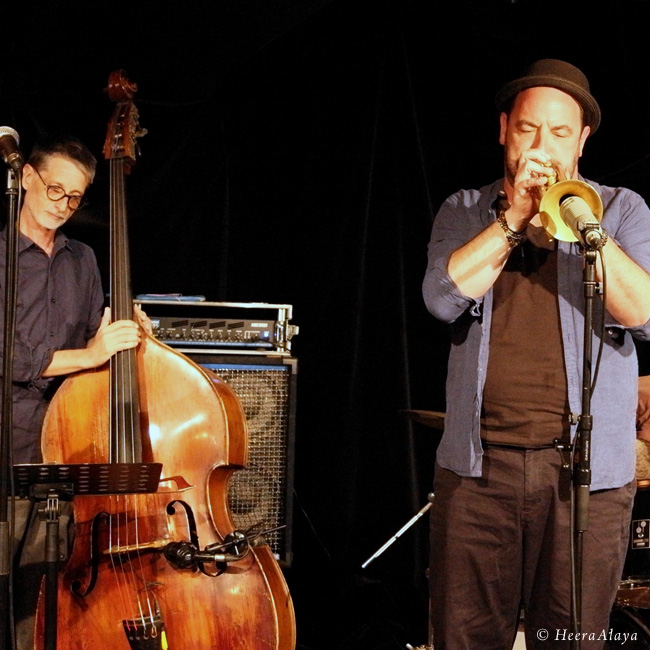
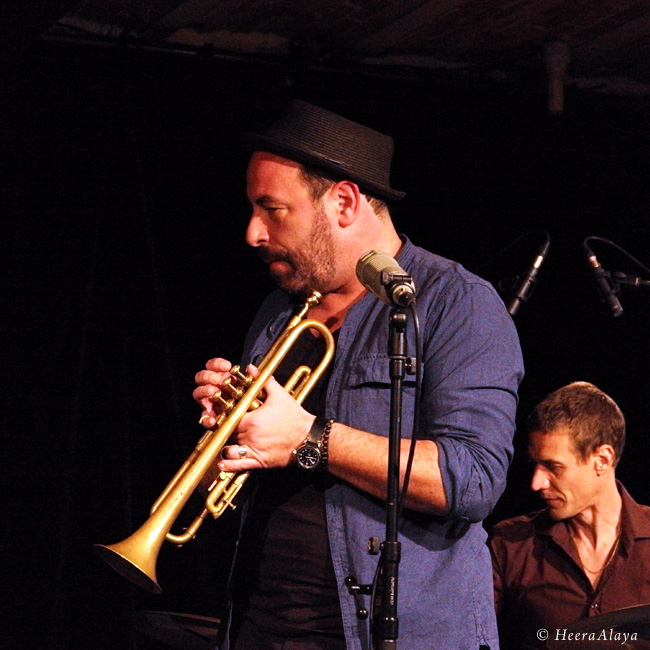
How do you hear your sound—do you record it and play it back?
It is a lifelong journey—you are constantly researching, trying to develop your ears and sound, and creating the sound you hear inside with the horn.
Do you sense how your sound has evolved?
Oh yeah! Sure. The more you go into the journey, the more your sound looks like what you want. I hear me when I play the trumpet—I don’t hear Mark Davis [singer, songwriter], Jeff Baker [pianist, composer] or Clifford Brown [jazz trumpeter. Pianist]. When you get to this point, you start to say, “That’s me, and I like it.”
You never totally arrive—the more I play and the more I practice, the more I continue to get closer. Sometimes, you record yourselves to hear your sound; other times, you hear your sound through concerts (most of which are recorded). I can see the change if it is four to five months since I set foot in a studio.
You may be sick or tired; many things make you feel differently. I don’t know what will happen tonight [the night of the concert] with my horn.
Are on-stage theatrics an essential accompaniment to your musical craft? And how do you infuse your performance with your personality?
Wow, that’s a good question. It [performance] is essential. We are on stage; people are watching you and hearing you. It is said, “The best way to hear jazz is to watch it,” and I believe it. If you listen to what happens, you can bring the music to a very complex level at many points. Most people will say, “That’s too much; I don’t get it.’ But if you see the piano player looking at the drummer, the finger of the bass, how the trumpet player blows the horn and how he tries to focus on the sound, even if the music is complex, it is an amount of information that makes music more natural. So yes, performance is essential.
I am focused on the music, the complexity, etc, so I am unaware of how I look or how people will see me. I would love to know this aspect, but I need to figure out how to be more photogenic. You know what I mean?
[Laughter]
Do you have a pre-concert ritual, say, drinking a beer?
Sure. Maybe two or three [beers].
[Laughter]
We used to have a ritual with other bands—have strong shots of whiskey before getting on stage. And why not? I know people who need other forms of drugs to get on stage, and I know people who don’t need anything.
And others have lavender tea!
Yeah.
[Laughter]
Whatever rocks your boat.
Yeah, whatever works for you. You need to deal with the emotion, stage fear—
Do you have stage fear?
Stage fear depends on the situation—a new project, a massive venue, continuous travel or being too tired.
At what point do you have to conquer stage fear—after seeing the audience’s reaction or before getting on to the stage?
It [dealing with stage fear] is before getting on stage. When you are on stage, you are on stage, and it is too late to find any question. And then, when you are on stage, there is so much energy that even if you are tired, you forget your headaches and backaches, the adrenaline kicks in, and the music flows into you.
How do you unwind after a performance?
I like to meet the people from the audience and receive their impressions and emotions. Even if you receive applause or if people are happy to be there, it is essential to have feedback. When you return home, you go, okay, “I’m exhausted, but I have to work on this feedback.”
How do you improvise your sounds?
There is a lot of background—what I heard, what I have studied in my career, and who inspired me. You collect this information and try to make music your way. And you spend most of your life improvising.
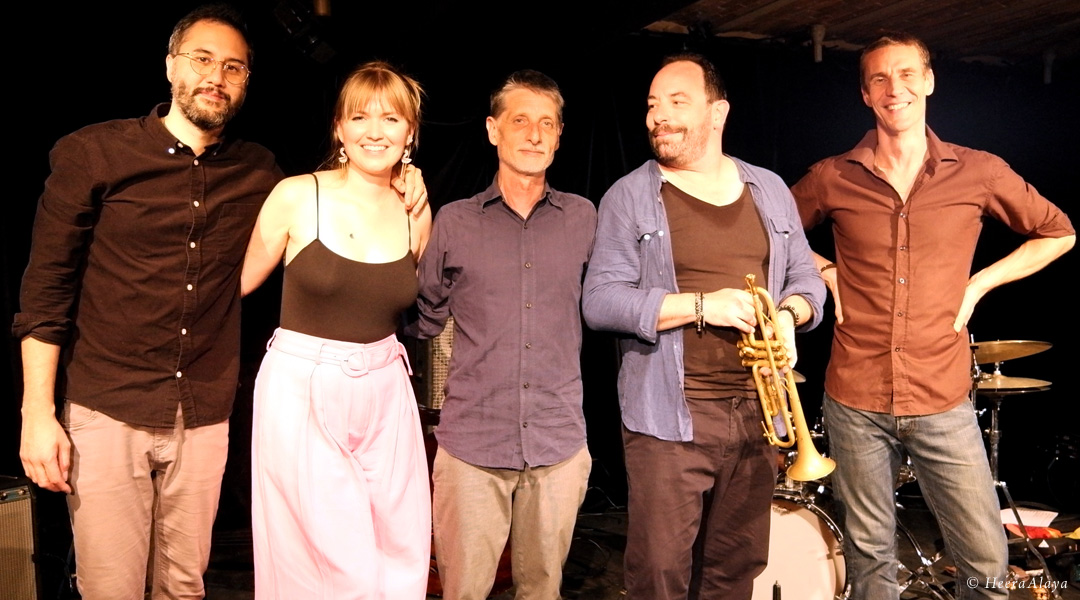
From left: Guitarist Andrew Sudhibhasilp, singer-songwriter Julia Minkin, bassist Pierre Fenichel,
trumpeter Christophe Leloil and drummer Cedrick Bec.
Are there other instruments that you appreciate? And if you weren’t a trumpeter, would you be playing a different instrument?
Sure. There are artists’ voices that are moving and touching. I like players and singers like Joni Mitchell [Canadian-American singer-songwriter] and Bjork [Icelandic singer-songwriter], who influence me. The way these women [Bjork and Joni] compose and sing is impressive.
Besides, being a teacher in a music conservatory makes me more curious and aware of what is happening in the world of music.
Do you need to possess specific qualities as a teacher as opposed to a performer?
The two elements teach themselves—the more you teach, the more you ask yourself how to explain things. How do you share what you have learned by yourself to be a professional musician and a composer? How will you share specificity about the musical range and show a direction to the students?
Do you go through seasons where you only teach or tour?
That’s my problem [mixing teaching and touring]. Today, I taught in Aix en Provence until 3 pm and drove to Avignon. Tomorrow, I teach in Marseille and perform at a concert in Aix. Next week, I will teach between Montpellier and Marseille for three days, and then we will leave for Vienna (and I will be driving). Only summertime is concert time.
So, you are constantly shifting gears.
Yeah. And it’s exhausting.
How do you stay centred?
Well, that is not the difficult part. Since music is part of my everyday life, it is to be focused on the music—teaching, composing and performing. However, sometimes, you need a break and a good rest, no music and return recharged.
Learn more about Christophe Leloil and his band, featuring Julia Minkin, Andrew Sudhibhasilp, Cedrick Bec and Pierre Fenichel.
